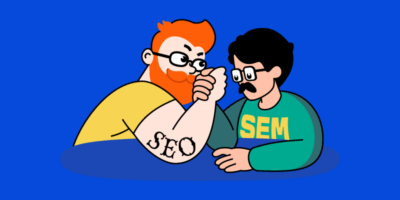Here’s the thing: on one side, we’ve got how people feel about SEO these days—the doom-and-gloom headlines, the panic about zero-click searches, the fear that AI has made everything obsolete.
But on the other hand, the data tells a totally different story.
The data says SEO is still one of the most effective ways to get in front of large audiences. It also plays a big role in shaping the answers AI assistants give to their growing user base.
So, let’s take a clear look at what’s actually going on.
While everyone’s focused on what’s changing, it’s easy to miss what’s staying the same. Google still processes billions of searches daily, the number of visitors who click through is higher than ever, and AI assistants are dependent on the web content that SEO helps create and optimize.
Despite all the AI hype, Google isn’t going anywhere.
Google still controls almost 90% of all searches worldwide. It’s true that Google’s market share has dropped (slightly) below 90% for the first time in 20 years, but we’re still dealing with search market dominance here.
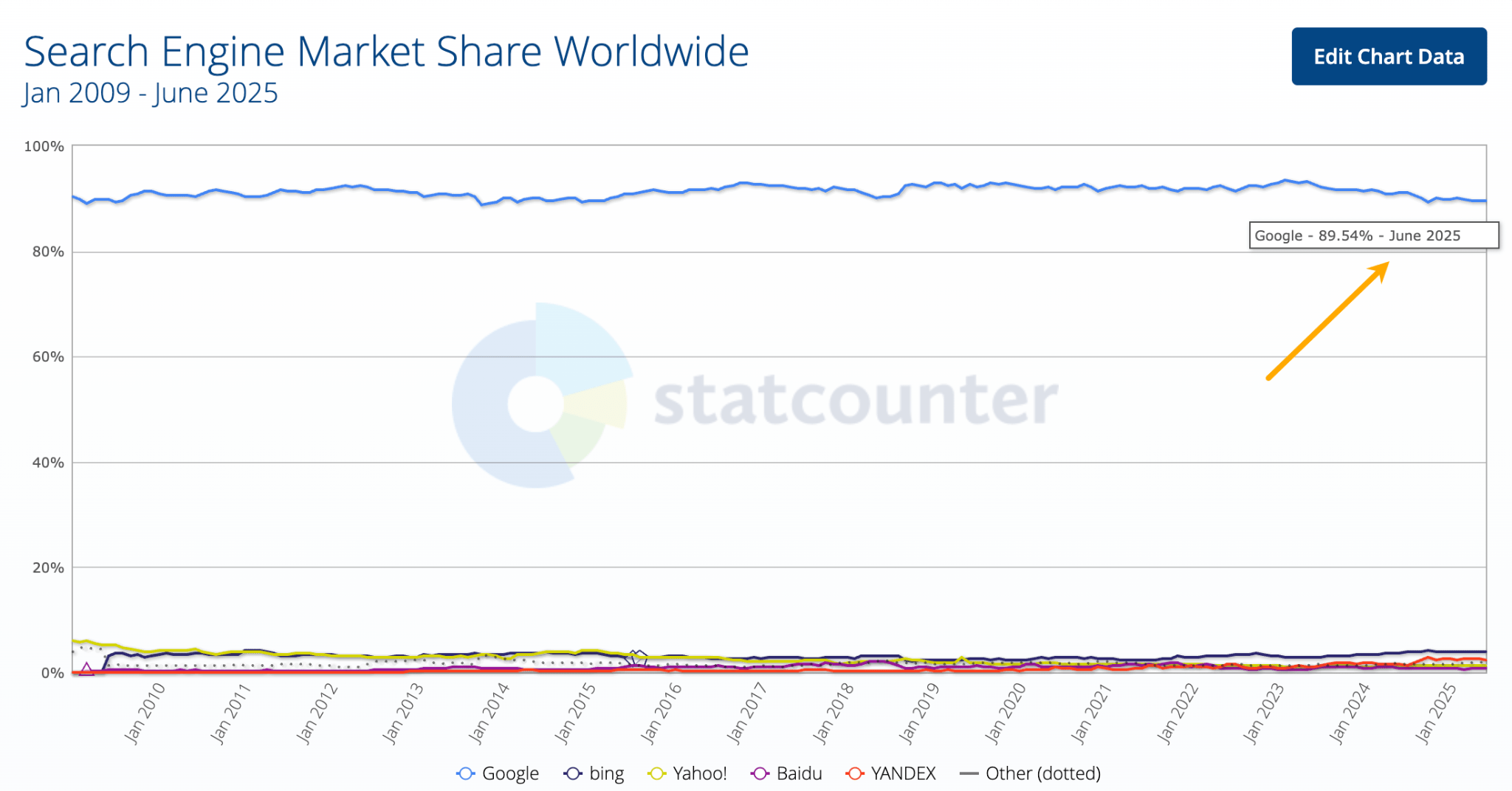
You can clearly see the dominance in the traffic source data. We checked about 82k sites and Google sent 345x more traffic than ChatGPT, Gemini and Perplexity combined.
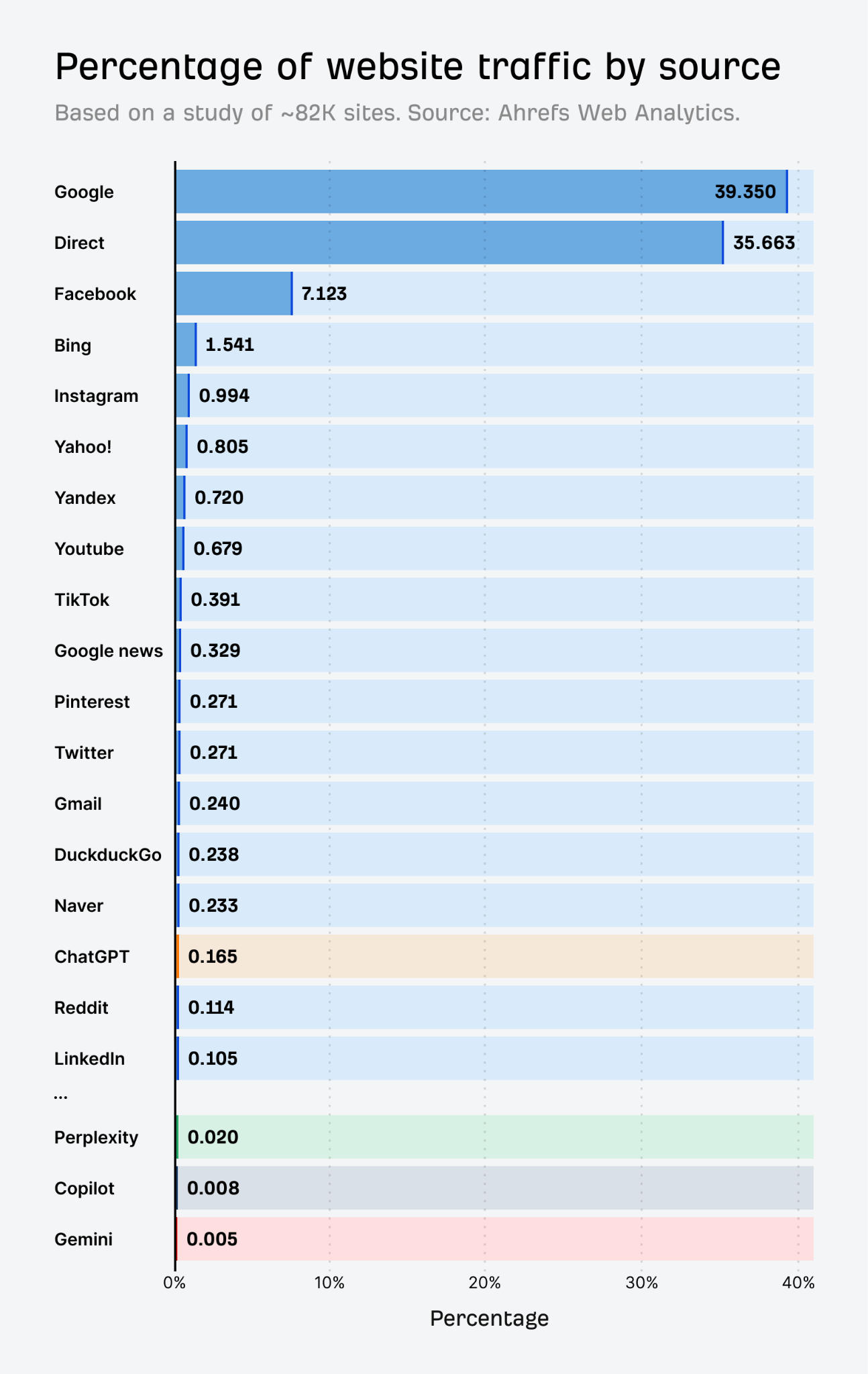
You can even see it in keyword search volumes. Whenever something becomes popular, people Google it.
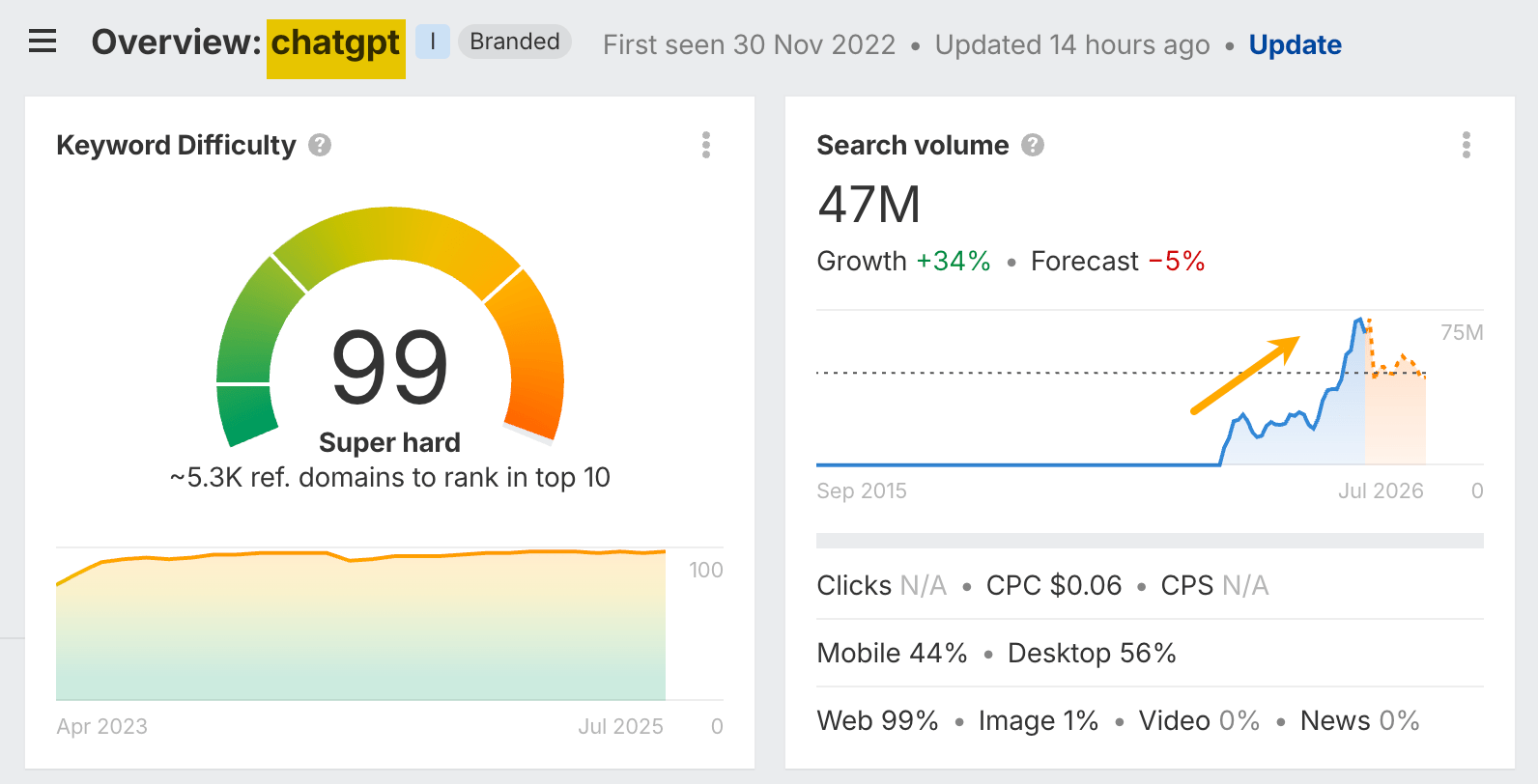
And, ironically, “is seo dead?” is being searched more than ever—people are literally Googling whether Google search is dead.
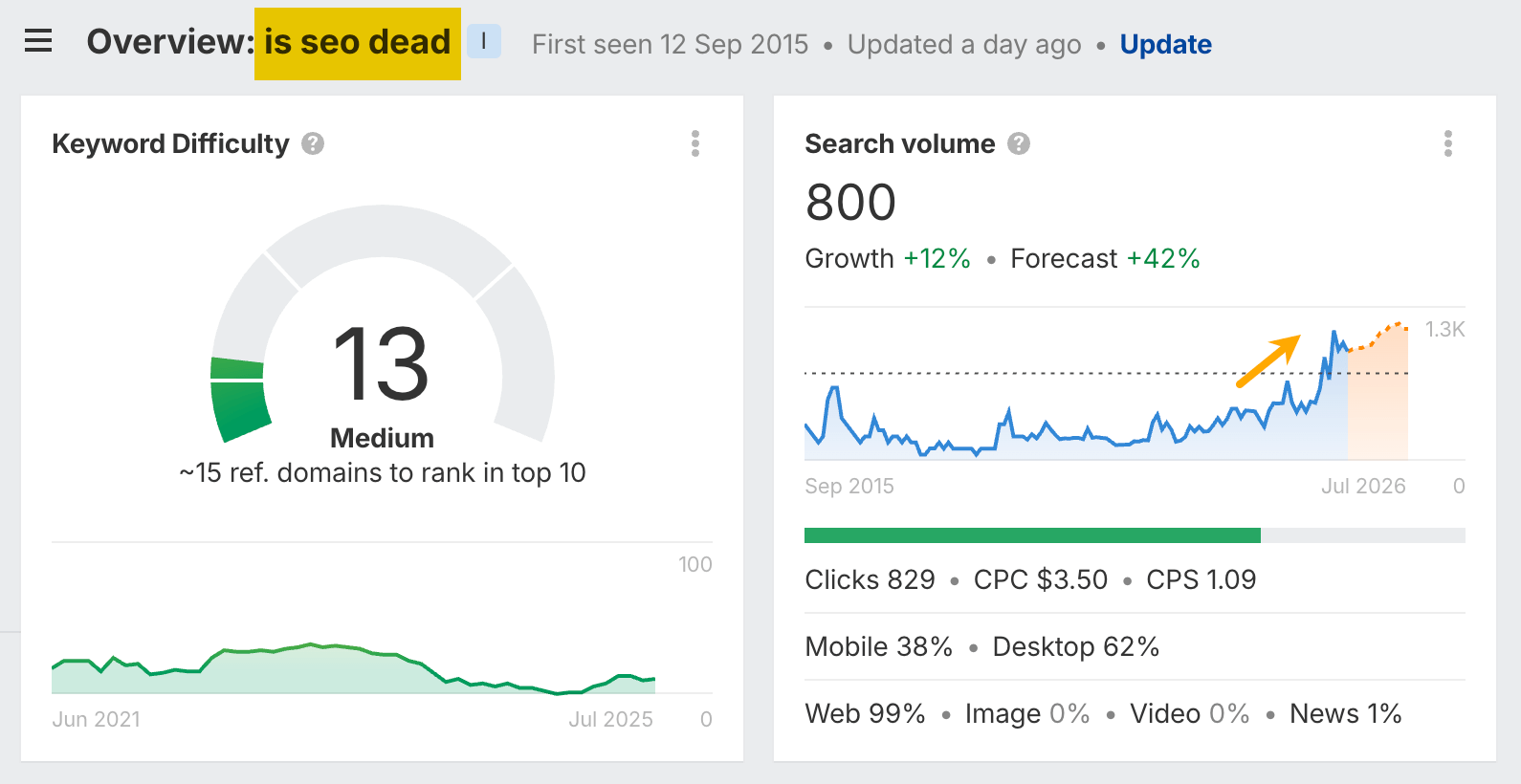
Yes, you may get fewer clicks than before. But think about it: the people who do click through are the ones who weren’t satisfied with Google’s AI summary. They want more detail, more depth, or they’re ready to take action. This brings us to another point.
Here’s the silver lining: the visitors you’re getting now are higher quality than ever before.
We found that traffic from AI assistants generated 12% of signups while accounting for only 0.5% of the overall traffic. That kind of traffic-to-signup ratio is unheard of.
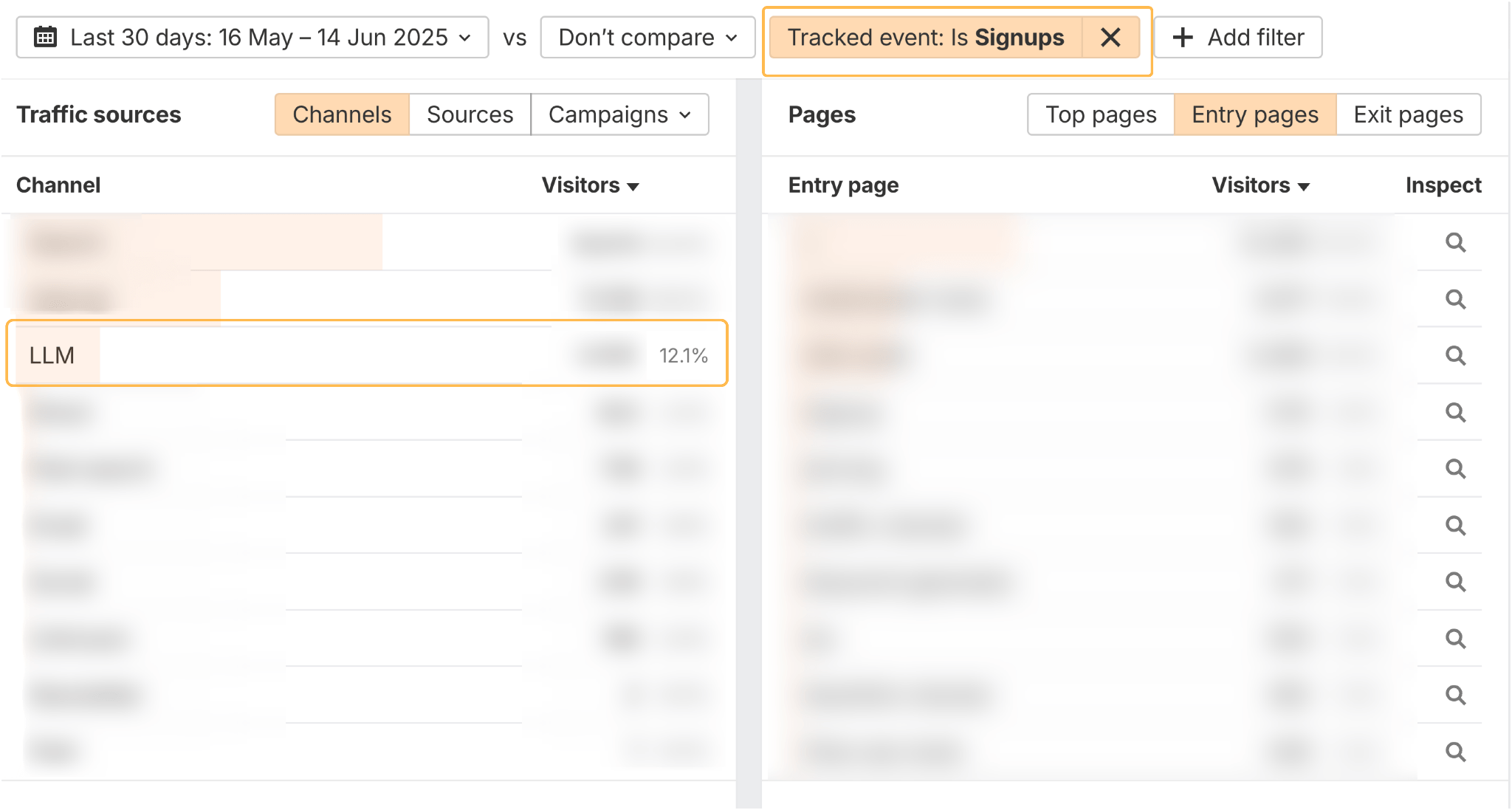
What’s more, fewer people bounce when coming from AI assistants compared to organic search.
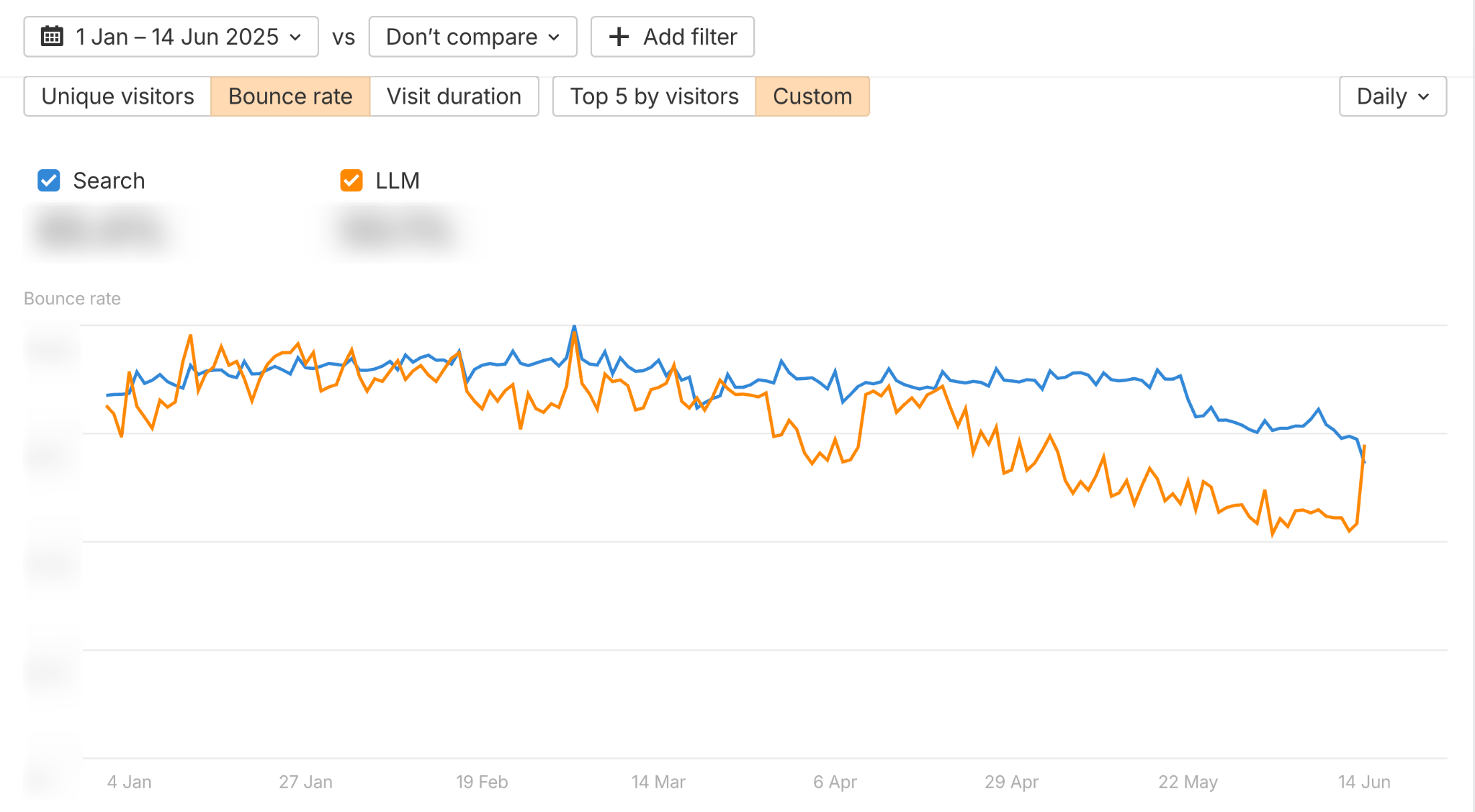
So, it seems that AI users generally fall into two groups:
- Quick answer seekers get their needs met. These folks just want a fast, simple answer. If AI gives them what they need right away, they’re satisfied and move on—no need to click through. This kind of traffic probably wouldn’t have converted anyway.
- Deep research users click through. The people who do click after seeing an AI summary need more than a basic answer. They want detailed guidance, want to try a tool, or are ready to take action. They’ve seen the overview and decided they need the full experience.
AI doesn’t create original information; it finds and repackages existing content, much of which comes from Google search results. Virtually all AI assistants use RAG (Retrieval-Augmented Generation) to find information beyond what they already know from the data they were trained on.
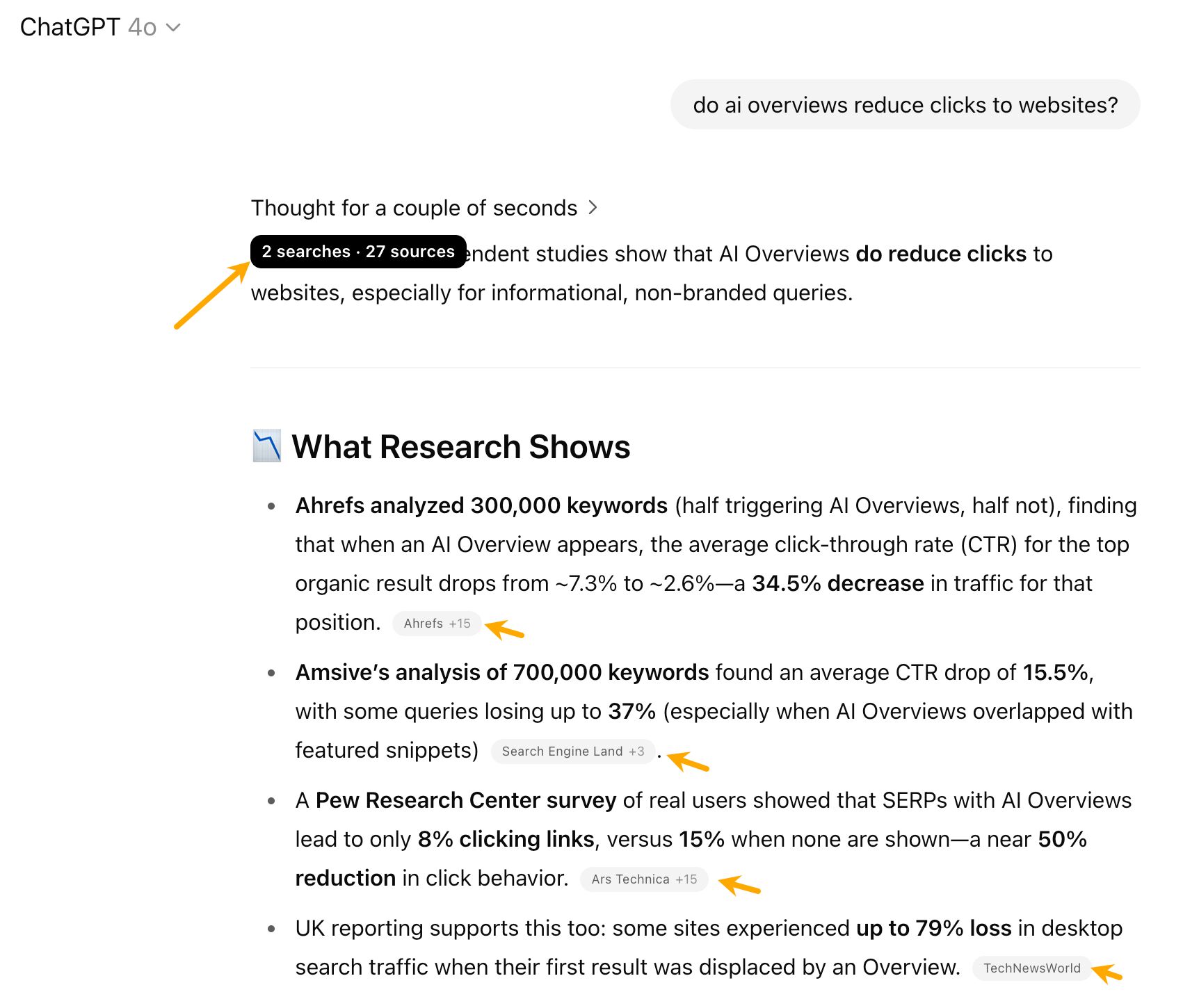
This means that ranking high in Google, Bing, or Brave search directly increases your chances of being featured in AI results.
Again, it’s all in the data:
- Websites with more organic search traffic get mentioned more often in AI search.
- A study showed that 9 out of 10 pages retrieved by SearchGPT from an external search engine are found among the first results of Google.
- 76.10% of AI Overview-cited pages rank in the top 10.
Traditional SEO becomes even more valuable because it now feeds two systems: direct search traffic and AI citations.
SEO results haven’t disappeared. Real businesses are still getting real results.
Content published years ago continues to drive tons of free, qualified traffic. Take our keyword research guide—it’s still pulling in visitors and generating leads even years after we hit publish. That’s the beauty of SEO: you create it once, and it keeps working.
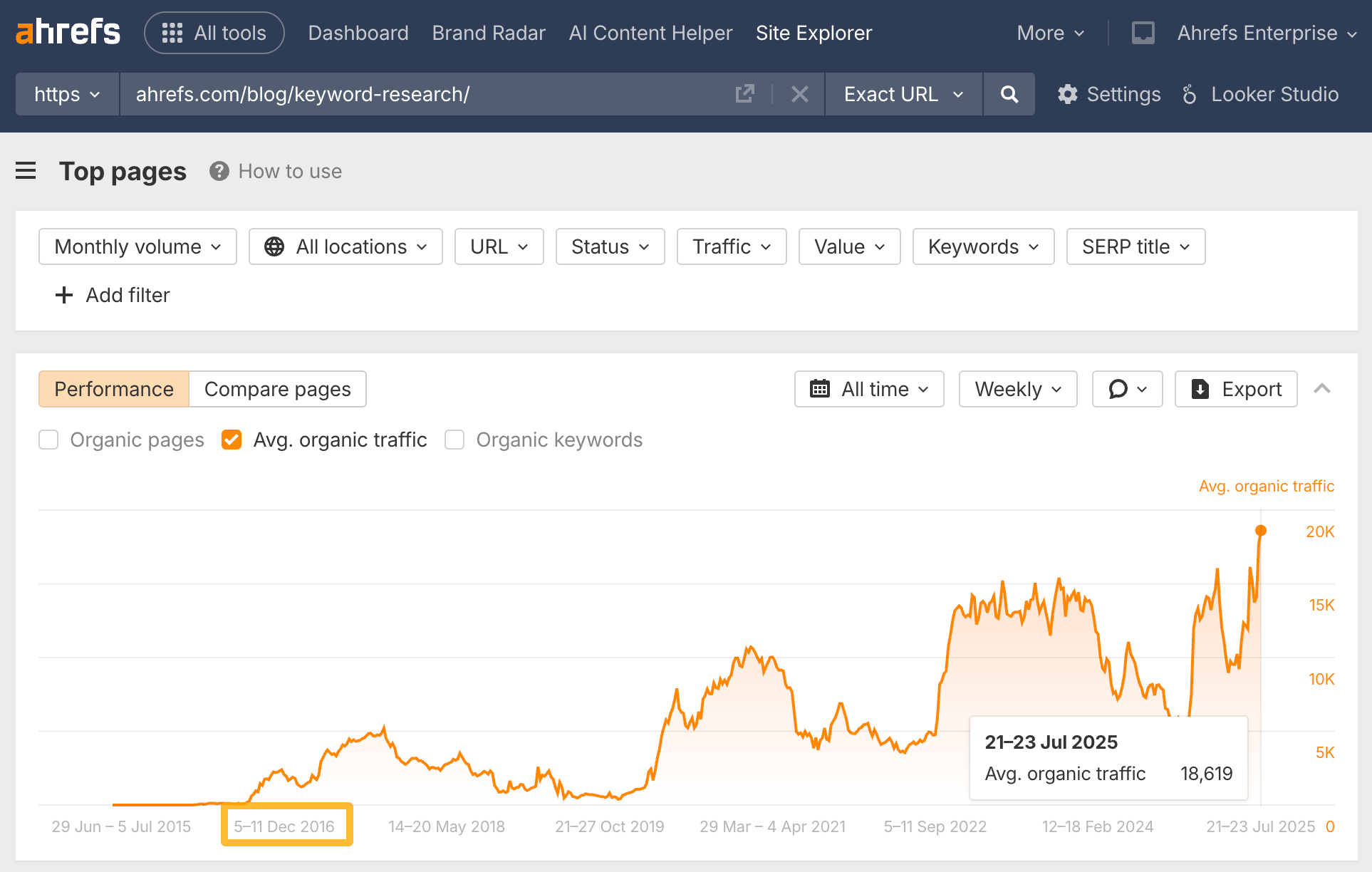
Another SEO technique, content refreshing, still works as well. To illustrate, when my colleague Louise refreshed old content using Ahrefs AI Content Helper, the traffic boost was immediate and sustained. Here’s how she did it:
Finally, it still makes sense to publish new content because it can still outperform your greatest hits. For instance, our recent study on how AI Overviews reduce clicks generated more traffic in the last 3 months than our keyword research guide, and that guide has been our top performer for years, as you can see above.
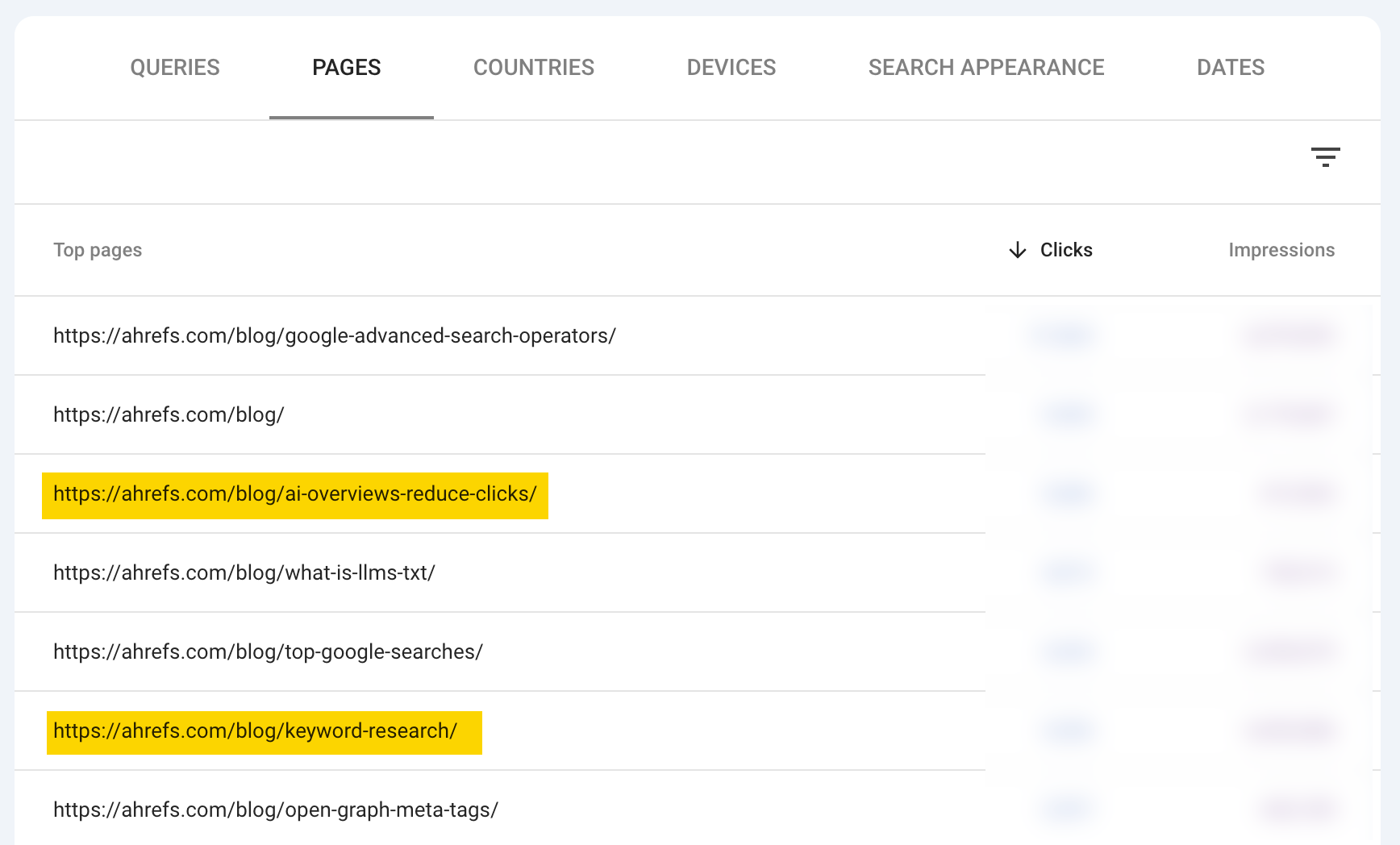
To be honest, the panic is understandable. AI Overviews are taking over the top of search results, and you’re losing clicks; it’s frustrating. While using AI to pump out content might sound like a quick solution, the reality is that everyone’s thinking the same thing.
Instead of directing you to websites, Google now answers your questions directly on the search page through AI Overviews (those AI-generated summaries at the top of results).
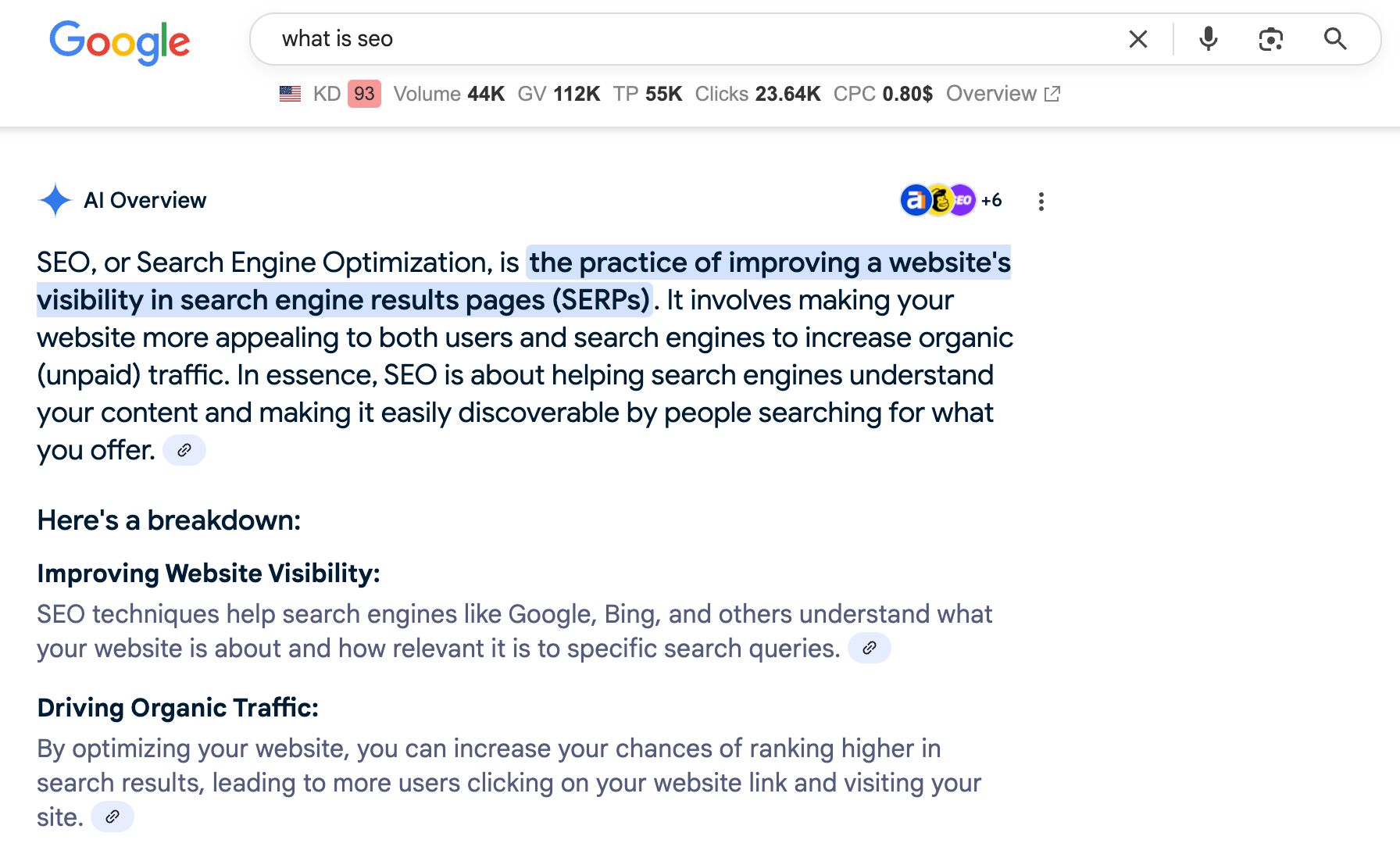
When we last checked, AI Overviews appeared in 16% of all US searches (more than doubled since March 2025).
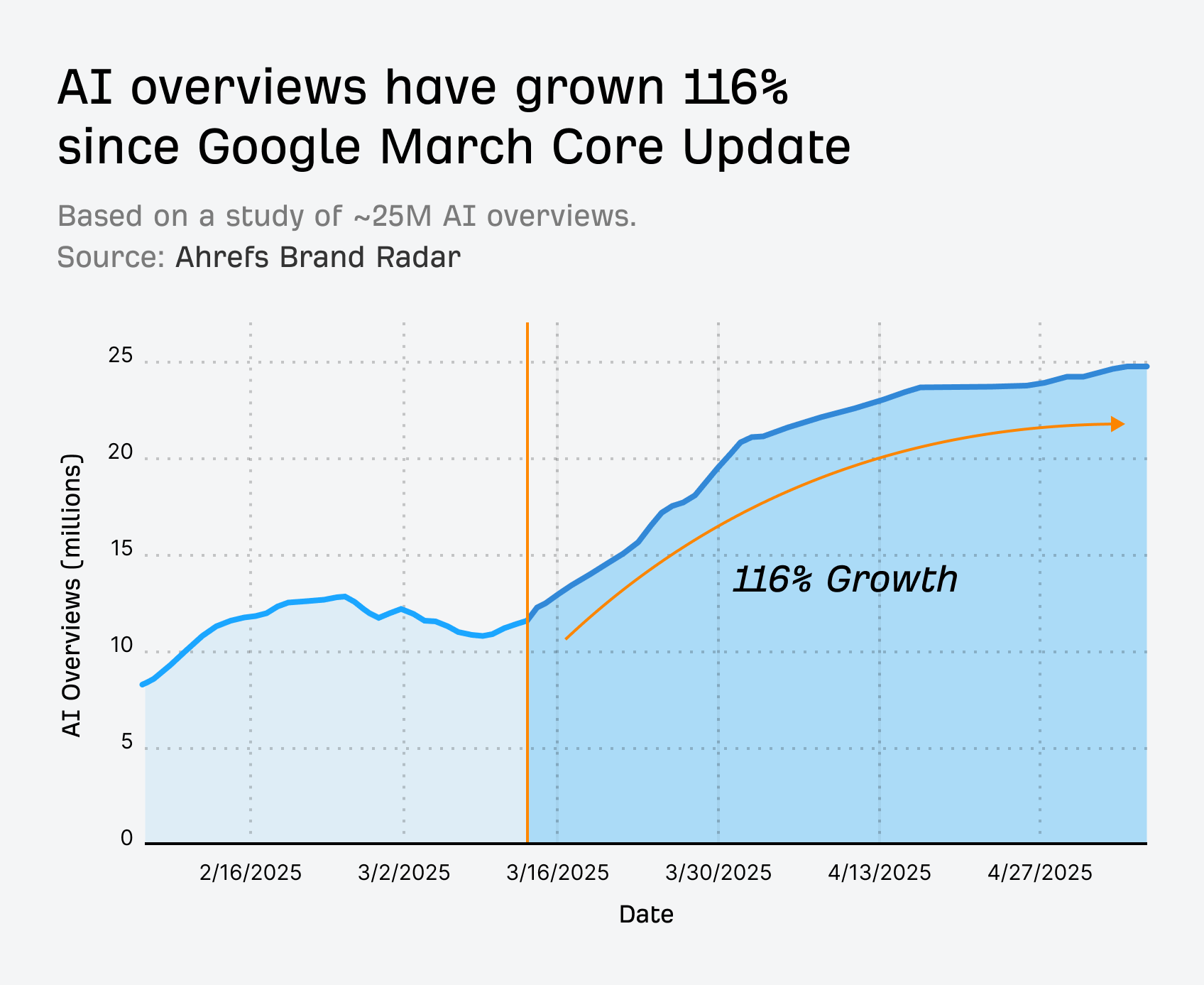
AI Overviews (AIOs) have broken the old pattern where more impressions usually meant more clicks. Now, it’s common to see impressions go up while clicks go down at the same time—the great decoupling. This shift shows up in what’s often called “crocodile charts” (example below) in Google Search Console, where the lines for impressions and clicks move in opposite directions.

The impact of AIOs on websites is massive:
- When AI Overviews appear, they can slash website clicks by 34.5%.
- Average website traffic from search dropped 21% over the past year.
Google used to be a librarian who pointed you toward the right book. Now it’s become the librarian who just tells you the answer directly, so you never need to pick up the book.
Gen Z isn’t searching the way you think they are. While you’re optimizing for Google, 45% of Gen Z is searching on TikTok, Instagram, and other social platforms instead. Even 35% of Millennials have made this switch.
See for yourself: look for any kind of product review on TikTok and check the engagement metrics.
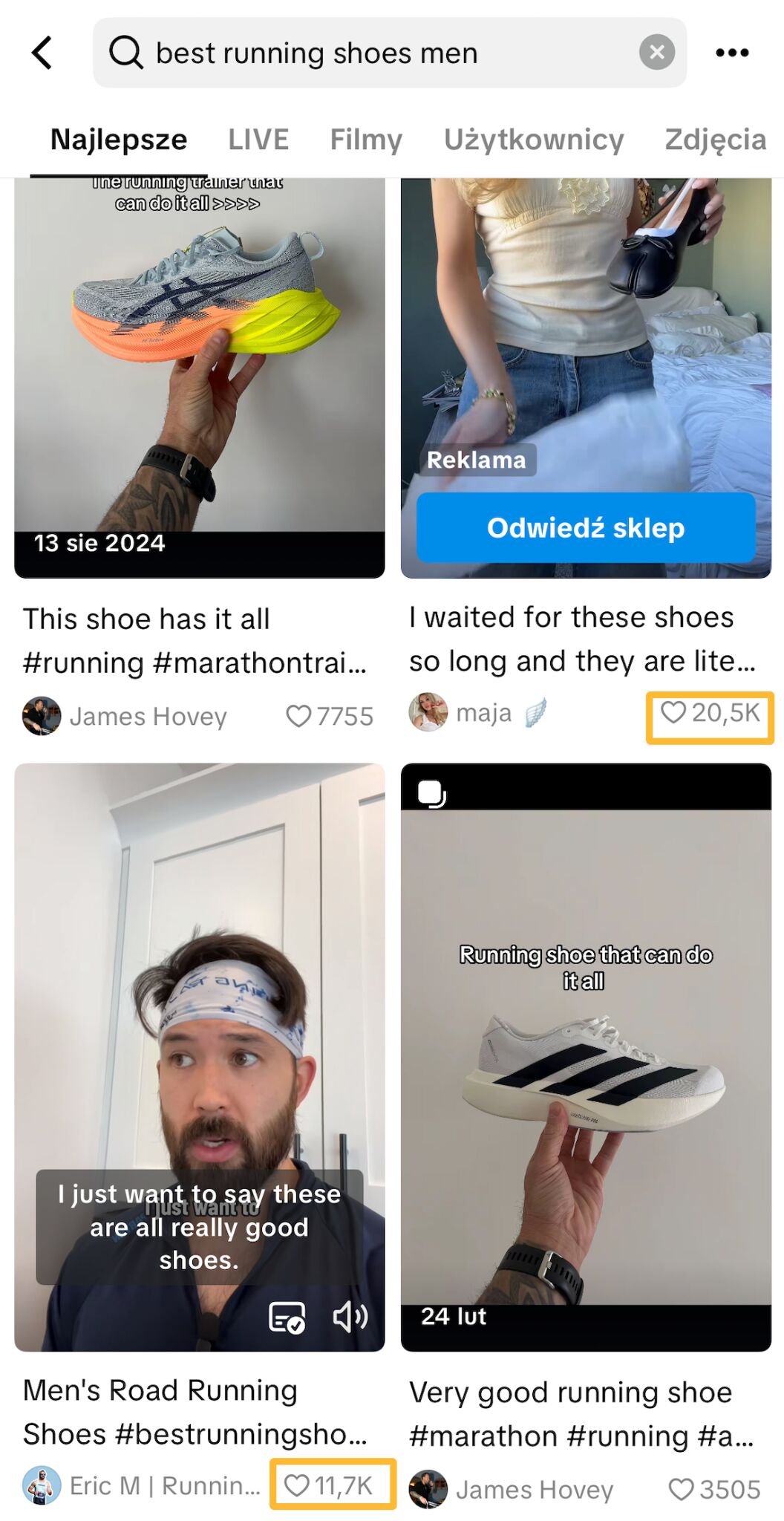
Why the shift? Convenience and preference:
- They want video, not articles. A 60-second TikTok review beats a 1,500-word blog post every time.
- They trust real people over brands. Authentic user content from someone’s bedroom can carry more weight than polished marketing copy.
- They prefer bite-sized, visual information. Quick, digestible content wins over long-form text.
Think about it: if you’re already spending hours on TikTok or Instagram, why leave the app to search on Google? It’s like asking someone to leave their favorite coffee shop to get coffee somewhere else.
Today, 74% of all new web content is created with generative AI, meaning only about 26% is entirely human-created.
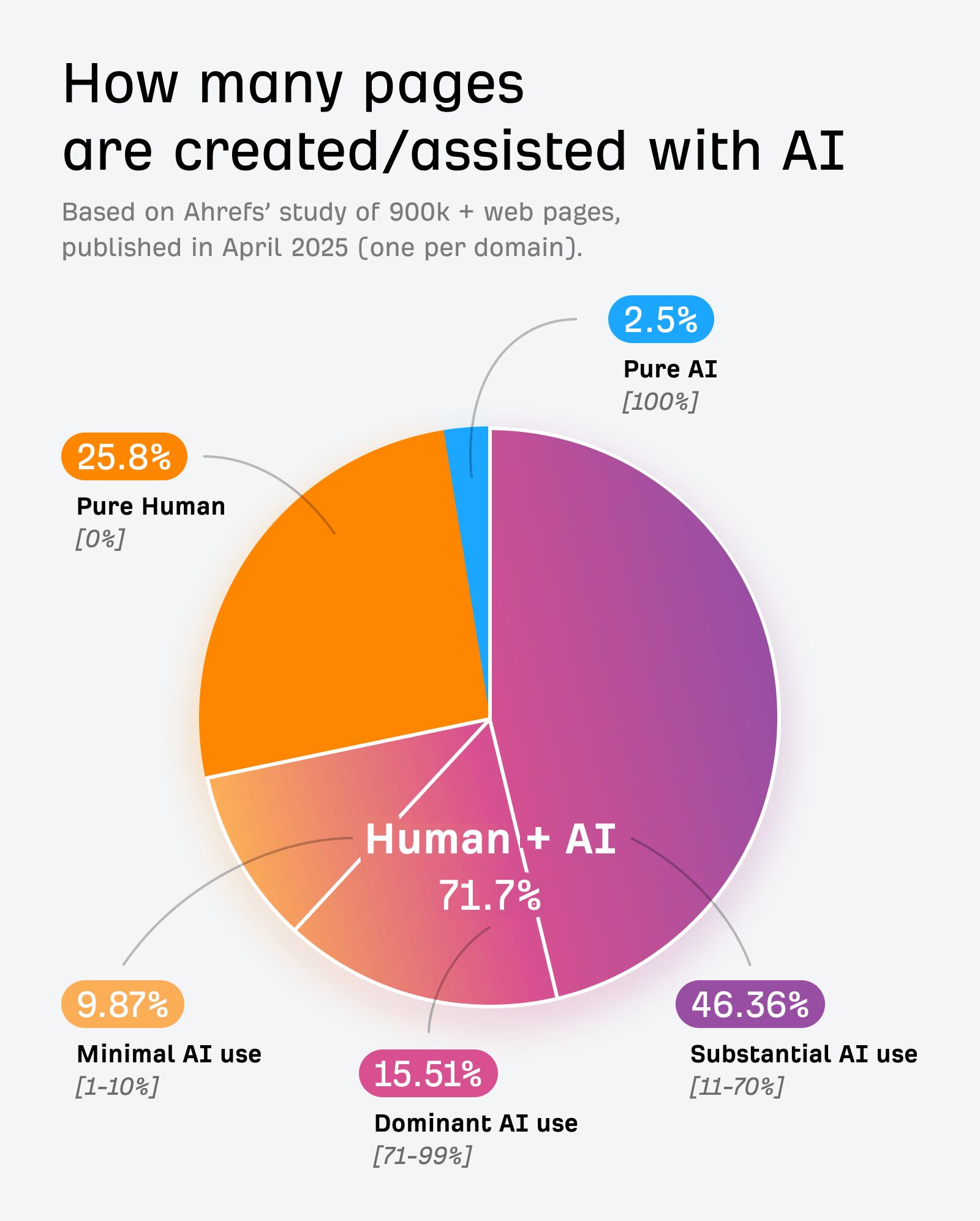
That competitive edge you built over the years with content? It’s gone almost overnight.
Your competitor who never wrote a blog post can now pump out 50 AI-generated articles per week with an n8n automation bought for pennies online.
And here’s the kicker—they can still rank for your keywords. When we analyzed the top 20 ranking pages of 100k keywords with our AI content detector, we found that only 13.5% of the content was pure human.
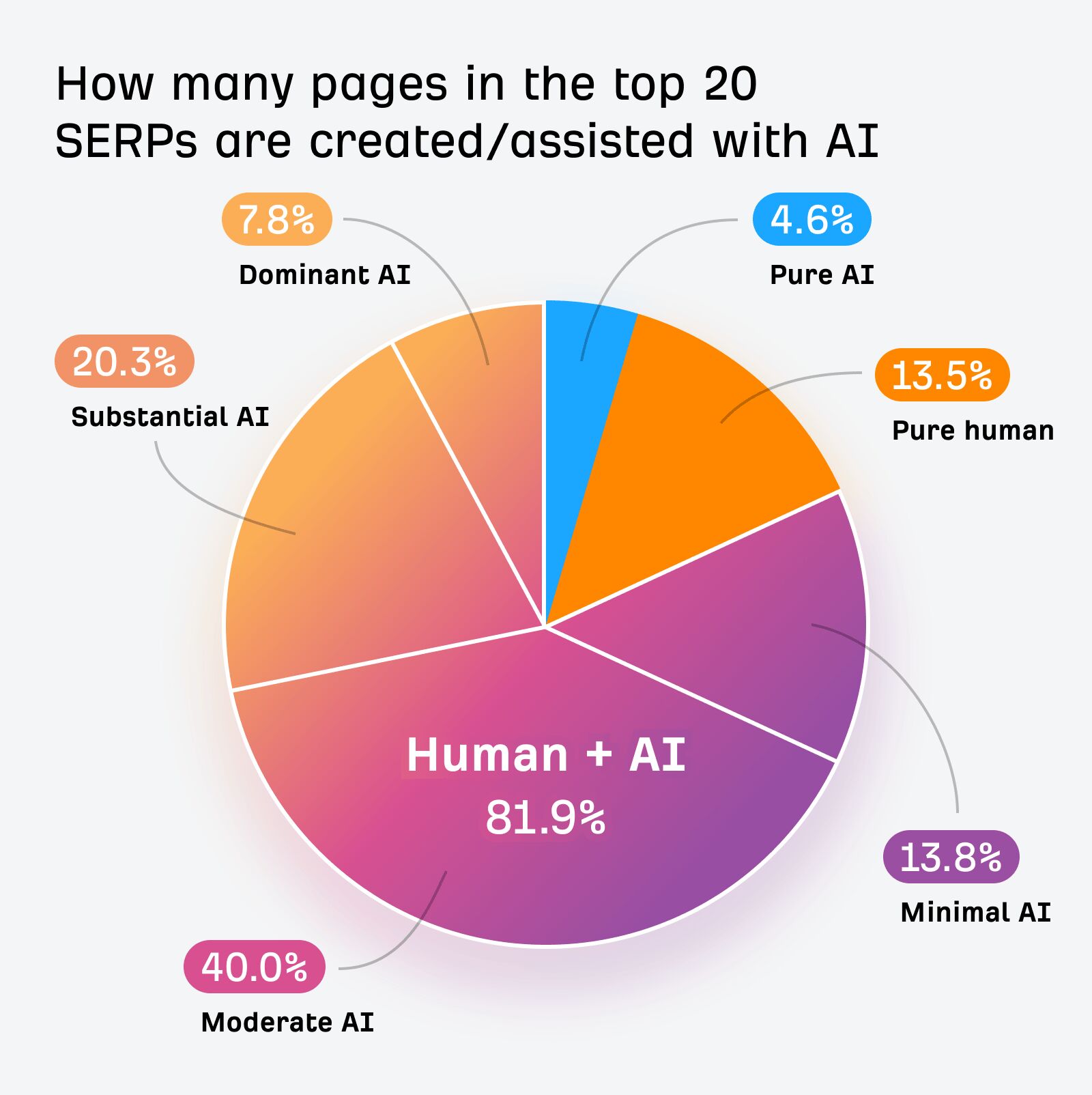
In a nutshell, here are the key changes you should consider:
- Instead of gaming algorithms, build genuine authority.
- Instead of optimizing for one search engine, optimize for an entire discovery ecosystem.
- Instead of creating content just to rank, create content so valuable that AI systems cite you as the expert source.
I’ll break down the details below.
Less traffic doesn’t mean no traffic. Even if you’re getting 30% fewer clicks, that’s still potentially thousands of qualified visitors per month. It’s silly to abandon the best acquisition channel most companies can access just because it’s not as easy as it used to be.
Adjust your expectations, refine your strategy, but don’t throw away years of SEO investment because the game got harder.
Your brand is now your most important SEO asset. Being a recognized, trusted, and consistently communicated brand matters more than ever because AI assistants and Google prefer to reference well-known, authoritative sources.
Again, it’s all in the data:
- The number of AI Chatbot mentions and brand search volume has a correlation of 0.334, which is high for this industry (to illustrate, the correlation of referring domains to organic rankings was 0.255 according to our study).
- Brand web mentions show the strongest correlation (0.664) with appearing in AI Overviews.
- Winner-take-all effect: Brands in the top 25% for web mentions get 10x more AI visibility than others.
In other words, when AI mentions your product over and over across multiple prompts, you win even without the click.
Let me illustrate this with Ahrefs Brand Radar. Here, I’m checking which of these project management tools get mentioned more often in AIOs.
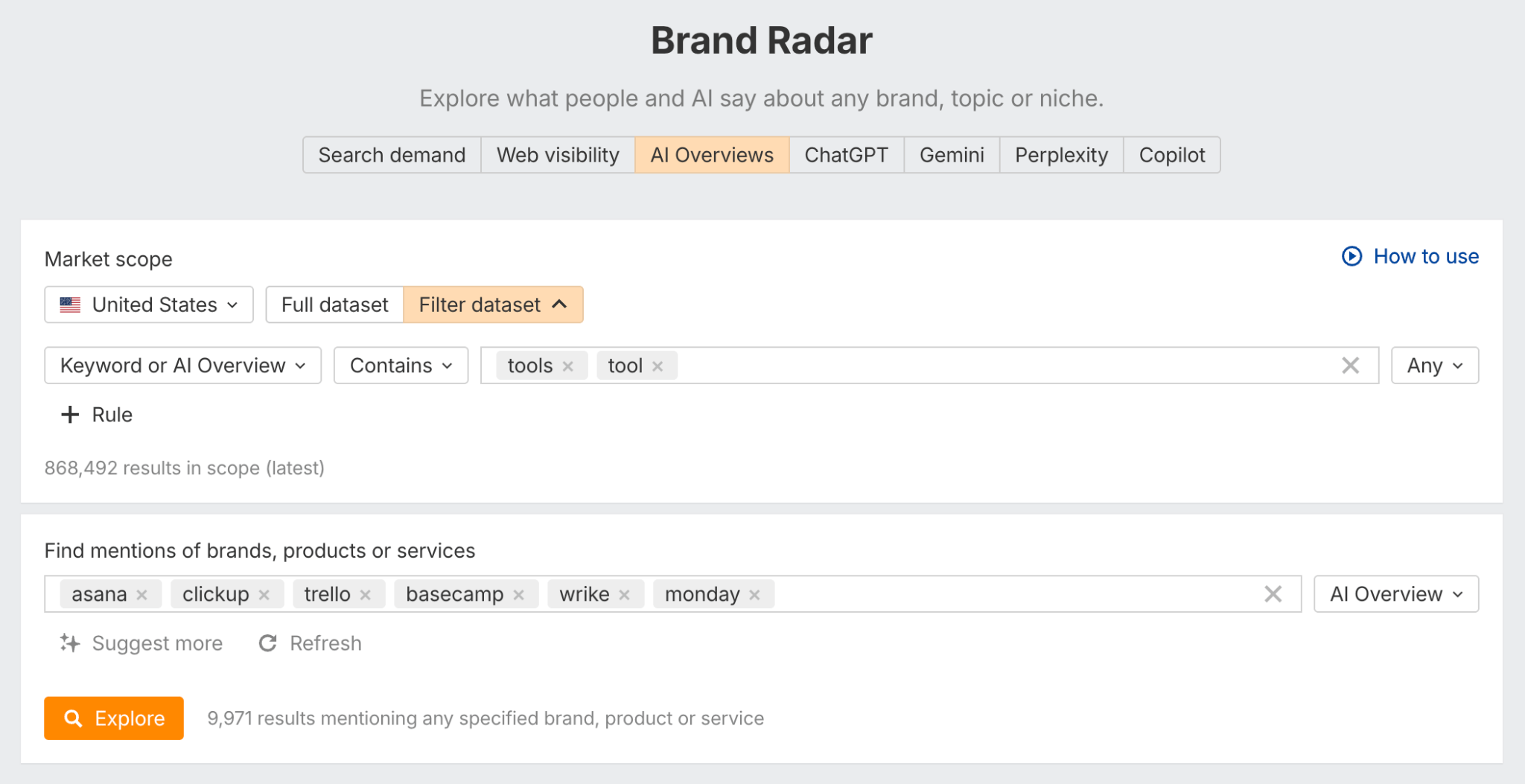
As you can see below, the brand that searchers will come across the most in this case is Monday. AIOs will recommend this brand in 60% of cases, which creates a massive advantage over the competition and a high probability that searchers will land on their website in some way, be it through a link, searching the brand name in Google, or visiting the URL directly.
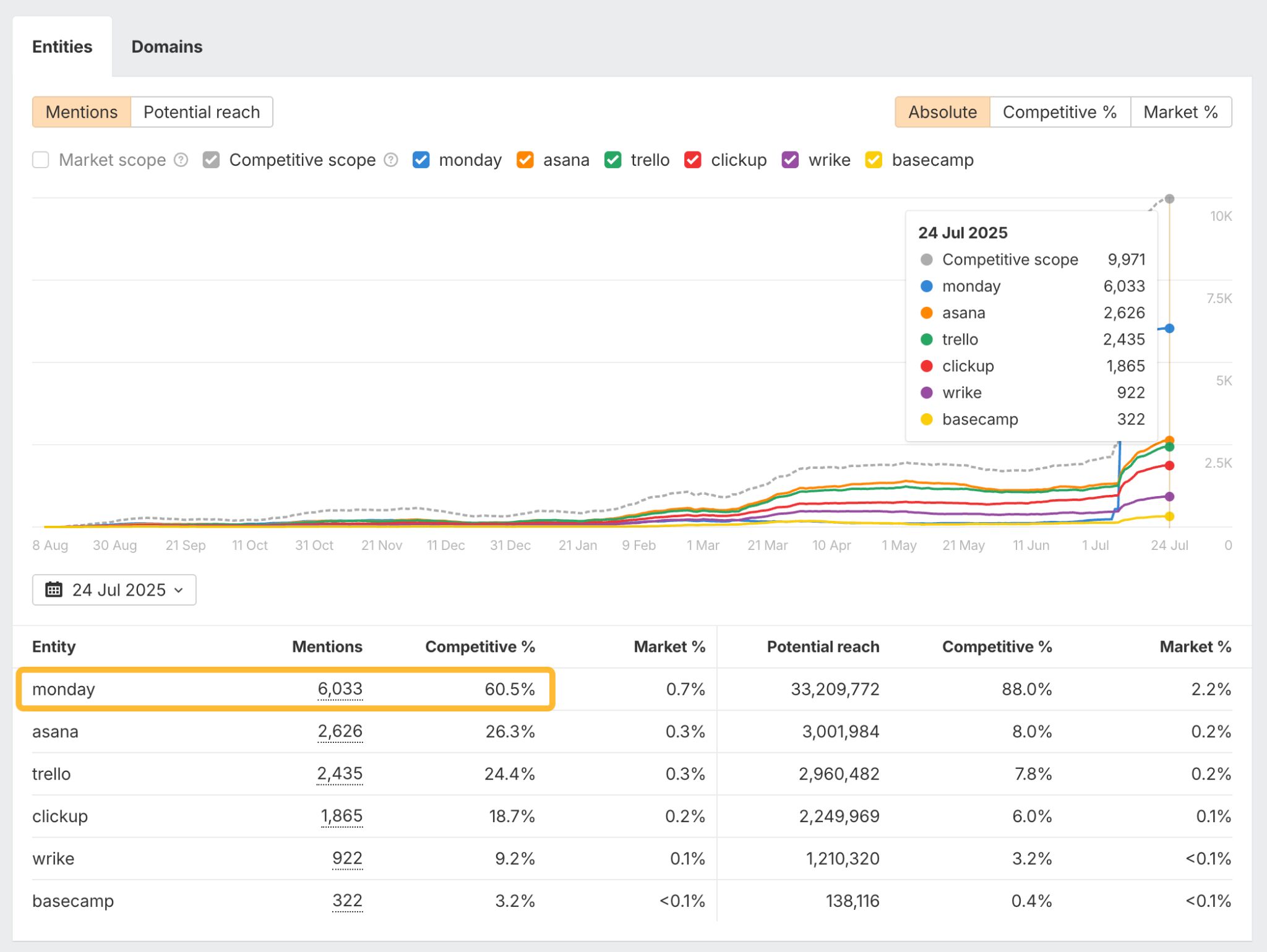
In 2025, brand building and SEO are inseparable. The companies that are winning are those that build brand authority while optimizing for search, creating a flywheel where each brand mention improves search rankings, and each search ranking builds more brand awareness.
We’ve documented exactly how to do this—from identifying the right brand building opportunities to measuring your progress with specific metrics. See the complete Brand SEO strategy.
Deep expertise in your niche gives you more visibility in AI overviews and search results, which still heavily influence consumer decisions.
To earn lasting visibility - and not short-term visibility bought by hacky LLM visibility tricks - your brand needs to signal to search engines and LLMs that it’s an authority in topics related to your offerings for the intended audience you serve.
Simply put, it’s about increasing the likelihood that your target audience sees your brand whenever they search for topics related to your product.
For example, Ahrefs focuses on topics like SEO, content marketing, and competitive intelligence because that’s what our audience cares about. By going deep on these topics—creating detailed guides, original research, and comprehensive resources—we’ve become the brand that AI systems cite when people ask SEO questions.
And, as you can see on this screenshot from our Web Analytics, it works: AI assistants cite our content. Without these pages, our brand would be absent from the AI results.
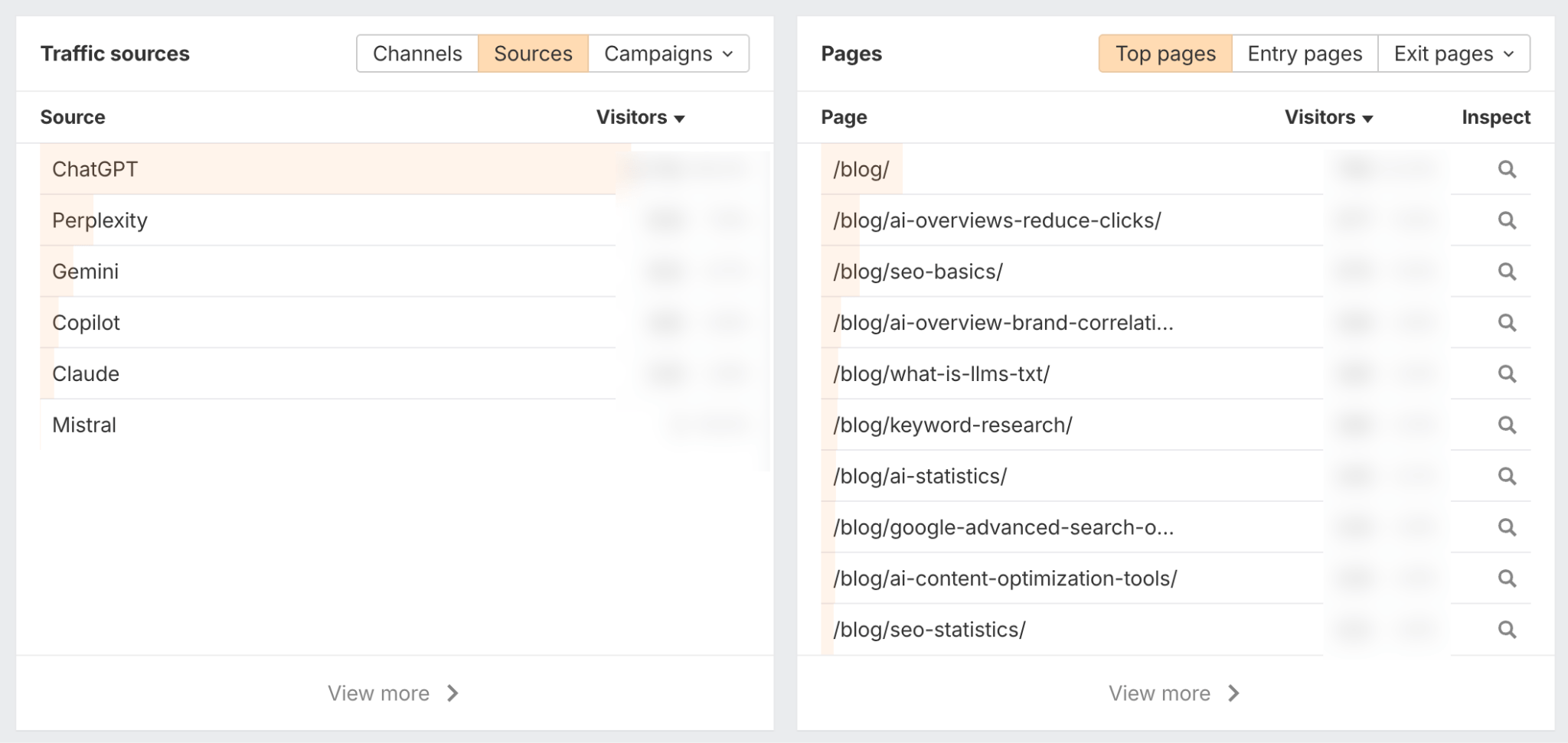
Bottom line: Don’t spread yourself thin across dozens of topics. Pick 5-10 closely related areas where your audience needs help, then become THE definitive resource on each one. When AI needs an expert source to cite, you want to be the obvious choice.
If AI can answer the search query in seconds, why would anyone click through to your site? Go deeper:
- Free tools: Create calculators, templates, or interactive resources. We found that “free tools” keywords didn’t experience the same CTR decline as other content, even when AI Overviews were present. Zero-click summaries weren’t enough; users had a job to do and needed the actual tool.
- Original data: Conduct surveys, analyze trends, and publish research that doesn’t exist anywhere else. Deep content that showcases unique experiences, expertise, and data naturally earns more backlinks—something essential for ranking in competitive spaces.
- Comprehensive guides: Be the definitive resource on your topic—the place people bookmark and return to.
Create content so valuable that AI summaries feel like previews, not complete answers. When someone needs to actually do something or get detailed guidance, they’ll still need to click through to your site.
People don’t just use Google anymore, that’s for sure.
Your potential customers are scattered across platforms, each with different search behaviors and intentions. A customer might discover you on TikTok, research you on YouTube, check reviews on Reddit, and only then Google your brand name. To keep up, the marketing world is starting to embrace a new approach: Search Everywhere Optimization.
Here’s where your future customers might be searching:
- YouTube: 70% of viewers bought a product after seeing it on YouTube. 82% of people say they’ve been convinced to buy or download a piece of software or app by watching a video (a 3 percentage point increase since last year).
- Reddit: Now appears in 77% of product review searches on Google.
- TikTok: 4 in 10 users buy a product after seeing it on TikTok. This is the power of the #tiktokmademebyuit phenomenon.
- AI Assistants: ChatGPT alone processes 1 billion daily queries from 800 million weekly users. While AI traffic is still small (0.1-0.5% of total traffic), in Ahrefs’ case, it converts 23x higher than organic search traffic.
- Pinterest: 553 million users conduct 2 billion monthly searches, with 93% actively planning purchases and 97% of searches being unbranded (meaning they’re open to discovering new brands).
Here’s a quick tactic you can use for Reddit: focus on threads that already have visibility in Google Search.
- Go to Ahrefs’ Site Explorer, enter “reddit.com”, and open the Organic keywords report.
- Use filters: positions 1-10, keyword includes (enter phrases related to your site). You can select a preferred location, too.
- Look for relevant keywords with a lot of traffic.
- Add thoughtful, useful answers to these high-traffic threads.
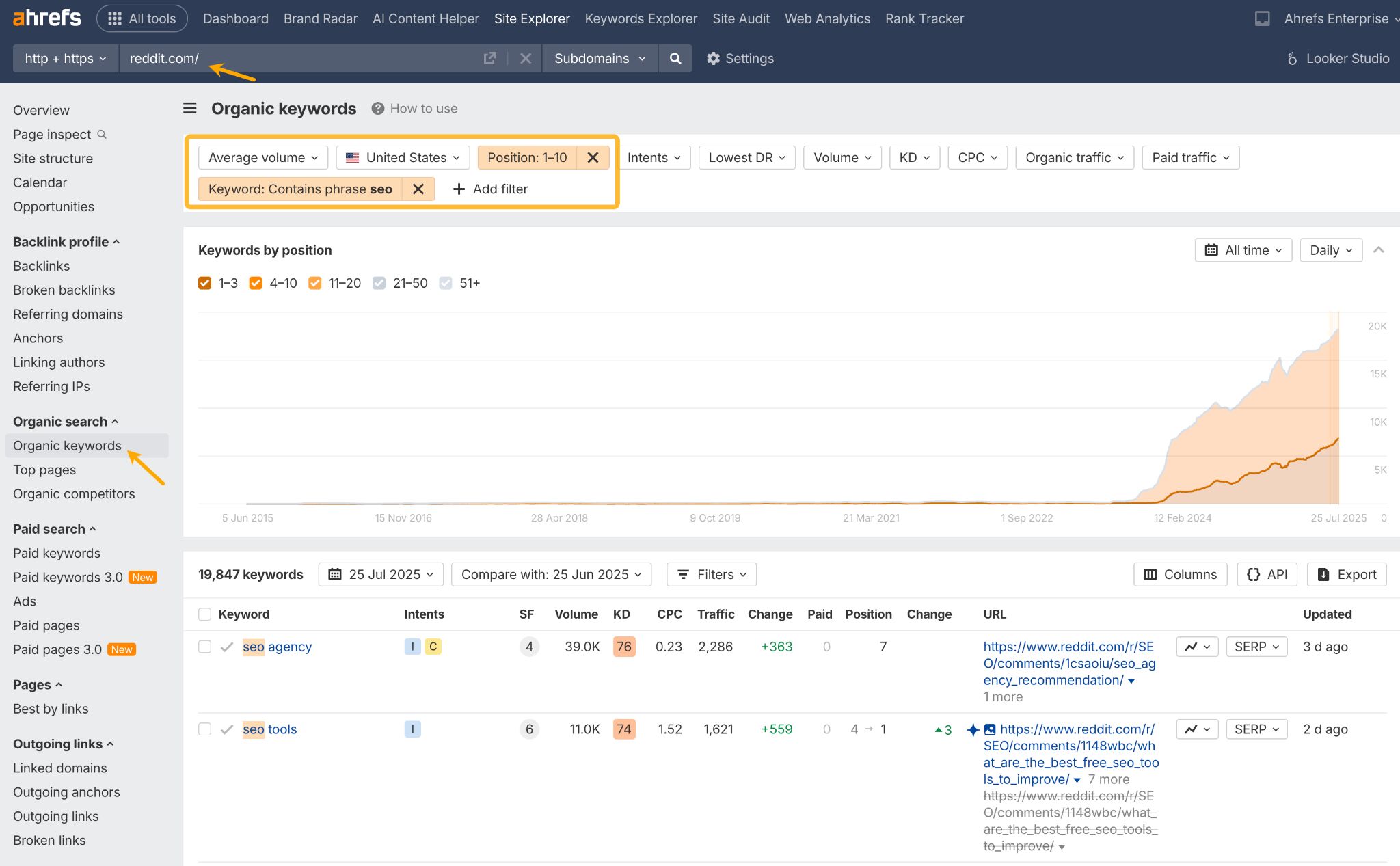
If your response is upvoted or sits near the top, it becomes part of what people see when they land on the thread from Google. And probably not Google alone: according to our data, Reddit has been mentioned in 12.859M AI citations, with 287% growth in the last 3 months.
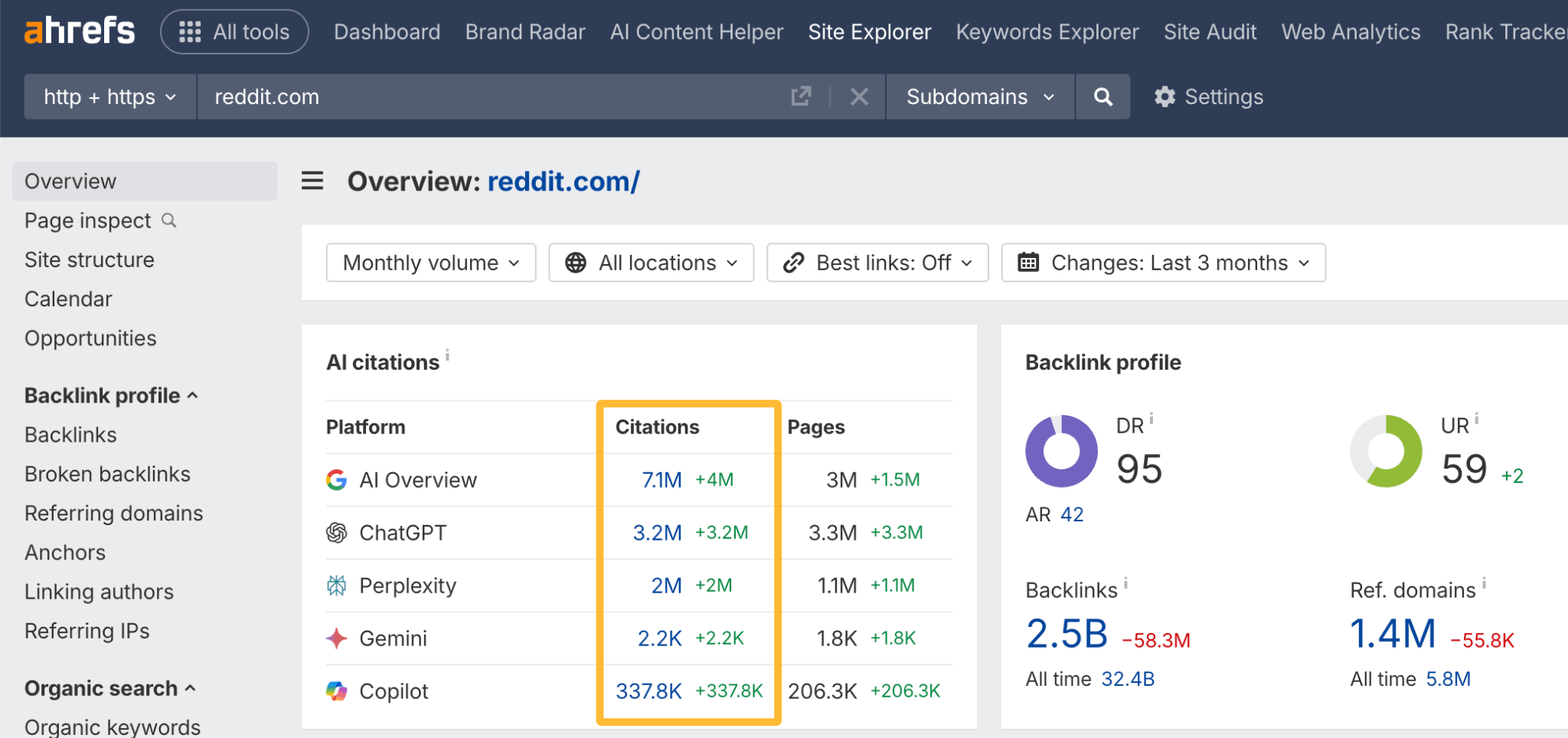
Final thoughts
While others give up on SEO or keep using outdated tricks, you can build visibility on every platform people use to search. In a nutshell:
- Build a brand people trust and recognize.
- Create content so good, AI-generated summaries just don’t cut it.
- Show up where your audience actually searches (it’s not just Google anymore).
- Be the go-to expert in your space.
Sounds familiar?
We regularly share updates on how AI is affecting search and what strategies are working right now. Follow our blog to stay ahead.
Got questions or comments? Find me on LinkedIn.


